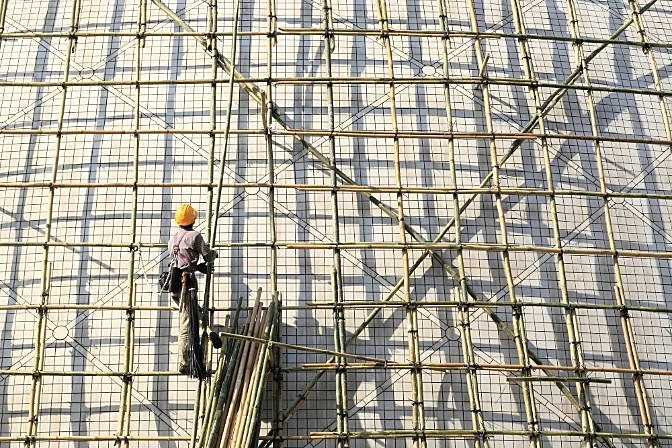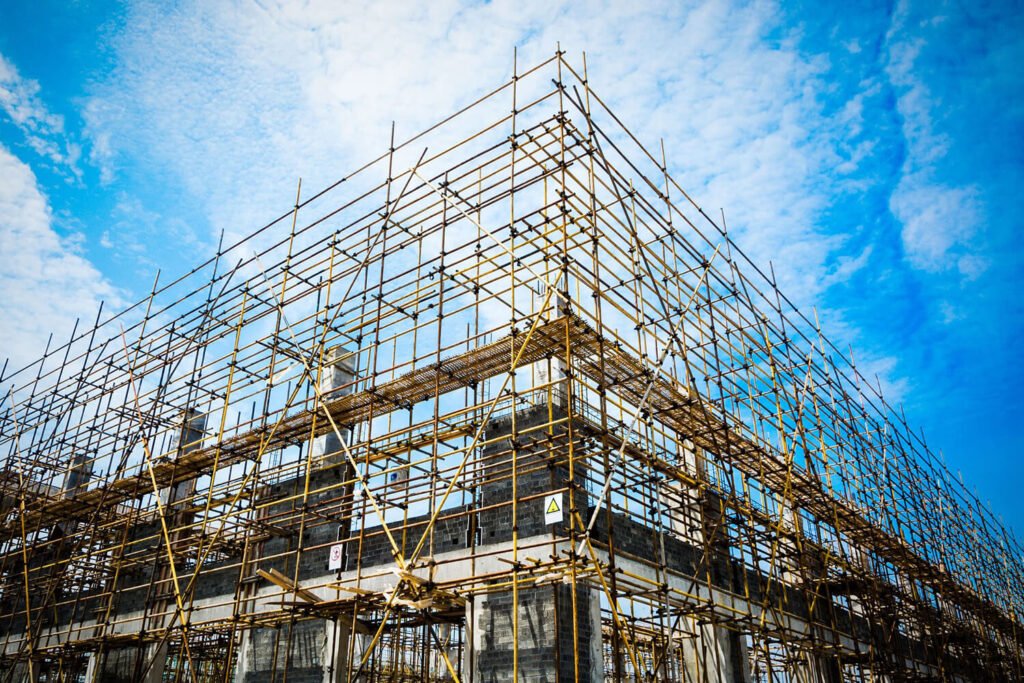Scaffolding Guildford: The Best Option for Your Building and Renovation Projects
Scaffolding Guildford: The Best Option for Your Building and Renovation Projects
Blog Article
Checking Out the Various Sorts Of Scaffolding Made Use Of in Construction Jobs
The building and construction market relies heavily on various types of scaffolding to satisfy certain project demands, each offering distinctive advantages and applications. Traditional framework scaffolding gives a strong structure for basic jobs, while put on hold scaffolding is crucial for job on high-rise structures.

Typical Structure Scaffolding
Standard framework scaffolding is among the most widely used approaches in the building and construction sector as a result of its effectiveness and adaptability. This system is composed of straight and upright structures that are set up to create a stable platform for workers and products. The main parts include upright messages, horizontal journals, and diagonal dental braces, which together supply a solid framework that can sustain considerable lots.
One of the vital benefits of typical framework scaffolding is its flexibility to various construction jobs, varying from residential structures to large business frameworks. The modular layout enables for very easy setting up and disassembly, making it reliable for both lasting and temporary projects. Additionally, the system can be personalized in height and size, fitting various building styles and site problems.
Safety and security is vital in scaffolding applications, and typical structure systems are furnished with guardrails and toe boards to stop falls and make sure employee defense. In addition, routine examinations and adherence to security regulations are important in preserving the stability of the scaffold. In general, conventional frame scaffolding continues to be a fundamental selection in the building and construction industry, giving a dependable platform for labor and improving total project performance

Suspended Scaffolding
Suspended scaffolding uses an one-of-a-kind remedy for building projects that need access to raised surface areas, especially in situations where typical structure scaffolding might be impractical. This sort of scaffolding is generally suspended from the roofing or upper levels of a structure, utilizing a system of platforms, ropes, and wheels to produce a functioning area that can be readjusted to numerous elevations.
Among the key benefits of suspended scaffolding is its flexibility. It can be quickly repositioned or reduced to suit modifications in building and construction requirements, making it excellent for jobs such as home window installment, façade work, and maintenance on skyscrapers. Furthermore, the very little footprint of suspended scaffolding enables far better use ground area in city atmospheres, where room is frequently minimal.
Safety and security is a crucial consideration in making use of suspended scaffolding. Proper rigging and securing systems have to be utilized to ensure stability and prevent mishaps. Operators needs to likewise be learnt the secure usage of this tools. Generally, put on hold scaffolding supplies a reliable and efficient option for accessing hard-to-reach locations in numerous building and construction circumstances, enhancing both performance and safety and security on site.
System Scaffolding
System scaffolding, often considered a modern-day remedy in the scaffolding market, includes pre-engineered parts that can be rapidly set up and adapted for various building jobs. Scaffolding. This type of scaffolding is defined by its modular style, which enables flexibility and efficiency weblink on job websites, accommodating structural requirements and different heights
Commonly made from high-strength steel or light weight aluminum, system scaffolding provides boosted sturdiness and security. The elements include vertical blog posts, straight ledgers, and angled dental braces, which adjoin safely, guaranteeing a robust structure. The design commonly includes standardized fittings, streamlining assembly and disassembly processes, consequently lowering labor time and costs.

Rolling Scaffolding
Rolling scaffolding is a functional option to typical fixed scaffolding, made for flexibility and ease of usage on building and construction sites. This sort of scaffolding contains a system supported by frames with wheels, enabling employees to conveniently transfer it as required. The movement attribute significantly enhances performance, as it minimizes downtime associated with constructing and dismantling taken care of scaffolding.
Generally constructed from lightweight materials such as light weight aluminum or steel, rolling scaffolding provides a tough yet mobile remedy for tasks requiring frequent repositioning - Scaffolding. It is specifically advantageous in tasks such as paint, drywall setup, and electrical work, where accessibility to numerous heights and places is essential
Security is critical in rolling scaffolding design, with features such as locking wheels to avoid unintended activity when in operation, and guardrails to shield workers from drops. Additionally, several versions are adjustable in elevation, suiting various job needs.
Cantilever Scaffolding

The design of cantilever scaffolding commonly includes using arms or braces anchored to a structure or framework, allowing the platform to extend external safely. Safety is vital; thus, these scaffolds should be engineered to withstand numerous tons and environmental conditions. Routine evaluation and maintenance are important to ensure structural honesty and worker security.
Cantilever scaffolding is favored for its convenience and effective use of anonymous space, making it a preferred option in city settings where space constraints are usual. It facilitates less complicated accessibility to high altitudes, ultimately adding to the overall performance of building and construction tasks. Similar to all scaffolding kinds, proper training and adherence to security requirements are important for workers utilizing cantilever scaffolding.
Verdict
Traditional structure scaffolding gives security, while put on hold scaffolding offers convenience for elevated jobs. System scaffolding helps with fast assembly, and scaffolding risk assessment template rolling scaffolding enhances movement for differing work settings.
Standard frame scaffolding gives a durable structure for general jobs, while put on hold scaffolding is important for work on high-rise frameworks.Moving scaffolding is a functional alternative to standard fixed scaffolding, created for mobility and convenience of usage on building and construction websites. As with all scaffolding types, proper training and adherence to safety standards are vital for workers utilizing cantilever scaffolding.
Standard frame scaffolding offers security, while suspended scaffolding supplies flexibility for raised tasks. System scaffolding helps with fast assembly, and rolling scaffolding enhances mobility for differing job atmospheres.
Report this page